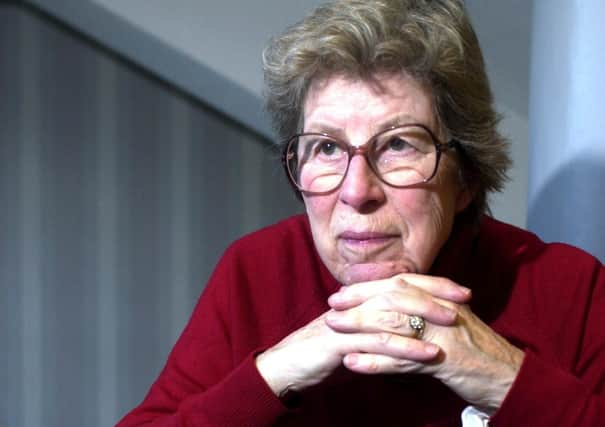Remarkable women who dedicated lives to helping others – Dr Gary Clapton


Earlier this year, two remarkable women died within the space of a month of each other. Aged 93, Vivienne Triseliotis died in April and Ann Mitchell was 97 when she died in May. For decades in their retirements, Vivienne and Ann worked for us for as searchers in the Scottish National Records tracing family trees and making sense of births, deaths and marriages. They located mothers, fathers, sons and daughters to inform our work in reuniting families separated by adoption. This short article is no substitute for their obituaries, these have been published elsewhere. Instead their special contributions to the work of Birthlink are celebrated.
Vivienne was a social worker and later lectured at the University of Edinburgh on medical, childcare and psychiatric social work. She researched adoption with her husband John and this research led to major changes for adopted people. The law (in England and Wales) was altered to give untrammelled access to original birth certificates. The research was also instrumental in changing attitudes to adopted people and their curiosity about their origins. Hitherto, such curiosity was disapproved of and regarded as an adverse comment on their adoptive family upbringing. The research established that an interest in origins was perfectly natural and to be welcomed.
Advertisement
Hide AdAdvertisement
Hide AdIn September 2018, Vivienne’s contribution to social work education and research at the University of Edinburgh was recognised by the presentation of the Nora Milnes Award. As part of the presentation, the present head of Social Work at the University said that “We owe an enormous debt of gratitude to Vivienne and other practitioner scholars who established the critical practice and evidence base for modern social work. Vivienne’s contribution to social work at Edinburgh has been significant, but its reach beyond Scotland should also be recognised and celebrated”. My comment at the event was related to the work of Birthlink: “Vivienne worked as a volunteer ‘searcher’ doing sterling work in the Scottish National Records tracking down family connections. If you allocated a search to Vivienne, you knew that it would come back successful”.
Ann Mitchell was another of our ‘volunteer searchers’. Like Vivienne, she was much more. During World War II Ann worked as one of the famous Bletchley code-breakers deciphering encrypted Nazi correspondence. After the war, the codebreakers of Bletchley Park returned to normal life and, having signed the Official Secrets Act and sworn not to divulge any information about her work, Ann never told anyone, not even her husband, about her wartime role. Decades later, once the work at Bletchley became common knowledge, Ann ‘came out’ and happily gave talks about her work.
It has been said that the work of the Enigma codebreakers shortened the war by two years but their achievements were not formally recognised until 2009 when Ann and other surviving Bletchley veterans were awarded a commemorative badge by GCHQ. “I am proud of what we did,” she said. “It is just a small badge, but it means a lot to me”.
In between the war and her work for Birthlink, Ann was a successful lecturer and academic committed to social change. Her field of interest was the effects of divorce on children. Her ground-breaking research prompted changes to Scottish law which ensured that the needs of children were properly taken into account in a divorce settlement. Her first book was Someone to Turn To, Experiences of Help before Divorce (1981), and, like Vivienne’s work, brought about change by drawing attention to shortcomings in Scottish legal procedures. Ann was particularly concerned that the needs and feelings of children were often ignored, and her work Children in the Middle (1985) documented this poor state of affairs and gave considerable impetus to the use of mediation in divorce cases. Ann also campaigned for greater rights for single parents. During the 1970s, she joined forces with my mother Jan Clapton and Gingerbread, the organisation that Jan had helped establish in Scotland, to successfully agitate for welfare reform.
Ann went about her work for us with the same dedication that she applied to everything she did throughout her life. When I worked for Birthlink, I looked forward to the prompt return of her search results. Pages of neat writing and a carefully drawn family tree would regularly lead to the person we were looking for, or at least someone who knew them.
For now, these few words about two special women will have to do as we await a Birthlink celebration of their work for the benefit of adopted people and their birth families.
Dr Gary Clapton, Reader in Social Work and Programme Director for BSc (Hons) in Social Work, The University of Edinburgh.
Comments
Want to join the conversation? Please or to comment on this article.